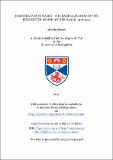Files in this item
Democrats into Nazis? : the radicalisation of the Bürgertum in Hof-an-der-Saale, 1918-1924
Item metadata
| dc.contributor.advisor | Bavaj, Riccardo | |
| dc.contributor.advisor | Fischer, Conan | |
| dc.contributor.author | Burkhardt, Alex | |
| dc.coverage.spatial | 327 p. | en_US |
| dc.date.accessioned | 2018-09-14T15:50:43Z | |
| dc.date.available | 2018-09-14T15:50:43Z | |
| dc.date.issued | 2017-01-04 | |
| dc.identifier.uri | https://hdl.handle.net/10023/16029 | |
| dc.description.abstract | This thesis analyses the radicalisation of the bürgertum in a single Bavarian town, Hof-an-der-Saale, in the five years after the First World War. It is bookended by two important and enormously different elections. In the first of these – the January 1919 elections to the National Assembly – the bürgerliche districts of Hof voted almost entirely for the German Democratic Party, a left-liberal, pro-Republican party that called for a parliamentary democracy, the separation of church and state, rights for women, a renunciation of German militarism and a close collaboration with the Social Democrats. But just five years later, in the Reichstag elections of May 1924, these very same districts cast their votes for the Völkisch Block, a cover organisation for the then-banned Nazi Party. Within half a decade, then, Hof’s bürgerliche milieu had switched its allegiance from a party of left-liberal democrats to the most radical nationalists in German history. Why did this dramatic and disturbing electoral turnaround occur? In an effort to answer this question, this thesis offers a detailed study of the narratives and discourses that circulated within Hof’s bürgerliche milieu during this five-year period. It uses newspaper editorials, the minutes of political meetings, electoral propaganda, the documents of civic associations and commercial organisations, the Protestant newsletter and a range of other sources in an effort to reconstruct what Hof’s Burghers thought, said and wrote between these two elections. What happened between January 1919 and May 1924 to transform Hof’s bürgerliche inhabitants from Democrat into Nazi voters, and how did this startling change manifest itself at the level of discourse and political culture? | en_US |
| dc.language.iso | en | en_US |
| dc.publisher | University of St Andrews | |
| dc.subject.lcc | DD801.B42B8 | |
| dc.subject.lcsh | Bavaria (Germany)--History--20th century | en |
| dc.subject.lcsh | Radicalism--Bavaria--20th century | en |
| dc.subject.lcsh | Nazis--Germany--History--20th century | en |
| dc.title | Democrats into Nazis? : the radicalisation of the Bürgertum in Hof-an-der-Saale, 1918-1924 | en_US |
| dc.type | Thesis | en_US |
| dc.contributor.sponsor | University of St Andrews. 600th Anniversary Scholarship | en_US |
| dc.type.qualificationlevel | Doctoral | en_US |
| dc.type.qualificationname | PhD Doctor of Philosophy | en_US |
| dc.publisher.institution | The University of St Andrews | en_US |
| dc.identifier.doi | https://doi.org/10.17630/10023-16029 |
This item appears in the following Collection(s)
Items in the St Andrews Research Repository are protected by copyright, with all rights reserved, unless otherwise indicated.

